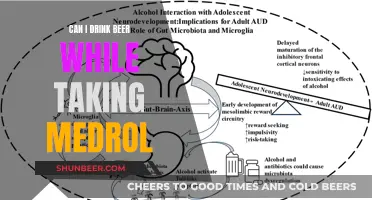
Alcohol is a significant source of calories and carbohydrates. A 12-ounce serving of regular beer has 153 calories, while a light beer has around 100 calories. This means that drinking 3-4 beers can add up to hundreds of extra calories. By cutting out beer, you can reduce your caloric intake and promote weight loss, especially if combined with healthy habits like physical activity and staying hydrated. The amount of weight lost will depend on various factors, including your daily calorie consumption, exercise habits, age, and genetics.
What You'll Learn
- A regular beer has 153 calories, while a light beer has 103 calories
- Cutting out beer may be an easy way to lose weight
- Alcohol is a significant source of both calories and carbs
- Alcoholic drinks are often high-calorie, so when you cut them out, you've suddenly got a deficit
- Drinking large amounts of alcohol can lead to poor quality sleep

A regular beer has 153 calories, while a light beer has 103 calories
Calories in Beer
The number of calories in beer depends on the type of beer and its alcohol content. A regular beer with 5% alcohol has around 150 calories, while a light beer with 4% alcohol has about 100 calories. Very low alcohol beers (2% to 3% alcohol) can have as few as 60 calories. The higher the alcohol content, the more calories the beer will have. For example, a lager with 4.5% ABV has about 135 calories, while a barrel-aged stout with 10.5% ABV can have up to 315 calories.
Calories and Weight Loss
One pound of fat is equivalent to approximately 3500 calories. This means that by eliminating 3500 calories from your diet, you can lose one pound of weight. Considering that a regular beer has 153 calories and a light beer has 103 calories, cutting out beer can help you reduce your calorie intake and promote weight loss.
Weight Loss by Cutting Out Beer
The amount of weight you can lose by stopping drinking beer will depend on how much beer you were consuming previously and your overall calorie intake and expenditure. For example, if you were drinking one light beer every day, you would consume about 700 extra calories per week. Over a month, this could add up to 3000 extra calories. By cutting out those beers, you could eliminate a significant number of calories from your diet and potentially lose weight.
Additional Benefits of Reducing Alcohol Intake
In addition to weight loss, reducing your alcohol intake can have other positive effects on your health. Alcoholic beverages are often referred to as "empty calories" because they provide calories without any nutritional value. When you eliminate these empty calories, you may find that your body starts burning stored carbohydrates and fats more efficiently, leading to reduced fat storage and weight gain. Additionally, alcohol can cause bloating and inflammation, so cutting it out may result in reduced bloating and improved overall health.
RV Beer Drinking: What You Need to Know
You may want to see also

Cutting out beer may be an easy way to lose weight
If you're a regular beer drinker, cutting it out could be an easy way to lose weight. Beer is a concentrated source of calories that offer very little nutritional value. A 12-ounce serving of regular beer has around 150 calories, while light beers are closer to 100 calories.
By cutting out two 12-ounce servings of regular beer a night, you save over 300 calories a day, which can translate to a weight loss of about 2.5 pounds in a month.
Calorie deficit
To lose weight, you need to create a caloric deficit. This means eating or drinking fewer calories, burning more with activity, or a combination of both. A safe and sustainable weight loss pace is typically 1 to 2 pounds per week.
Alcohol and weight gain
Alcohol is a significant source of both calories and carbohydrates. It also causes bloating, as it is an inflammatory substance, especially when combined with sugary or carbonated mixers.
Alcohol and metabolism
Alcohol also slows down your metabolism. It's not just the calories from the alcohol itself, but also the calories from the food you eat alongside it. A March 2015 study in Current Obesity Reports found that when alcohol consumption goes up, the ability to make nutritious dietary choices goes down. It's easier to choose high-fat, high-sugar foods while sipping alcohol.
Other health benefits of cutting out alcohol
In addition to weight loss, cutting out alcohol can improve your sleep quality, repair liver damage, decrease the risk of heart disease and cancer, and boost brain power.
Beer Without Refrigeration: Is It Safe to Drink?
You may want to see also

Alcohol is a significant source of both calories and carbs
Alcoholic drinks can contain hundreds of calories, and when consumed regularly, can lead to weight gain. For example, a typical light beer has 100 calories, while craft beers can be up to 350-400 calories per 12oz. A 5 oz serving of white wine contains 121 calories, and a 1.5 oz shot of vodka has 97 calories. These calories can add up quickly, especially when drinking in excess.
In addition to the high calorie content, alcohol also provides "empty calories". This means that the body burns through these calories first, leaving more opportunity for the body to store other sources of energy, such as carbohydrates and fats. This process increases the chances of fat storage and ultimately leads to weight gain.
The high calorie and carb content of alcohol is further exacerbated when mixed with sugary or carbonated substances. These additional mixers can add even more calories to the drink, increasing the likelihood of weight gain.
By eliminating alcohol from your diet, you can significantly reduce your calorie and carb intake. For example, someone who drinks heavily on a daily basis may be consuming 400 extra calories per day. Cutting out these extra calories can lead to significant weight loss over time.
Not only does alcohol contribute to weight gain through its calorie and carb content, but it also has other negative impacts on the body. Alcohol is an inflammatory substance and can cause bloating, especially when combined with sugary or carbonated mixers. Additionally, alcohol disrupts sleep, leading to tiredness and dehydration, which can further impact weight gain.
In summary, alcohol is a significant source of both calories and carbs, and reducing or eliminating alcohol consumption can have a positive impact on weight loss and overall health.
Beer and Medication: Safe Mix or Dangerous Cocktail?
You may want to see also

Alcoholic drinks are often high-calorie, so when you cut them out, you've suddenly got a deficit
Alcoholic drinks are often high in calories. A 12-ounce serving of regular beer has 153 calories, while light beer has 103 calories. A 5-ounce serving of white wine contains 121 calories, and a 1.5-ounce shot of vodka has 97 calories. Cocktails can be even higher in calories, with a classic margarita containing 274 calories or more.
When you cut out these drinks, you reduce your calorie intake, creating a deficit. This deficit can lead to weight loss, as your body now has fewer calories to burn. The amount of weight lost will depend on various factors, including your daily calorie consumption, exercise habits, age, and genetics. However, cutting out alcohol can be an effective way to reduce your calorie intake and contribute to weight loss.
For example, let's say you drink two 12-ounce servings of regular beer each night. By cutting out beer, you would save around 300 calories per day, resulting in a weight loss of about 2.5 pounds in a month. If you consume more alcoholic drinks or choose drinks with higher calorie content, the weight loss could be more significant.
It is important to note that weight loss is not solely dependent on calorie intake. Other factors, such as physical activity, hydration, and overall diet, also play a crucial role. Increasing healthy habits, such as regular exercise and proper hydration, can enhance the weight loss effects of reducing alcohol consumption.
Additionally, alcohol can interfere with weight loss by disrupting sleep quality and increasing cravings for high-fat, high-sugar foods. By cutting out alcohol, you may find it easier to make nutritious dietary choices and maintain a consistent exercise routine, further contributing to weight loss.
In summary, alcoholic drinks are often high in calories, and cutting them out can create a calorie deficit, leading to weight loss. The amount of weight lost will vary depending on individual factors, but reducing alcohol consumption can be a effective strategy for weight management when combined with other healthy lifestyle choices.
Beer and Pacemakers: What You Need to Know
You may want to see also

Drinking large amounts of alcohol can lead to poor quality sleep
Alcohol can decrease the amount of time spent in the restorative rapid eye movement (REM) sleep, which is crucial for healing, retaining memory, and feeling rested. The more alcohol you drink, the more your sleep quality decreases. A small serving of alcohol (under two drinks for men and under one for women) can decrease sleep quality by 9.3%. A moderate serving of alcohol (about two drinks for men and one for women) can decrease sleep quality by 24%. A large serving of alcohol (more than two drinks for men and more than one for women) can decrease sleep quality by 39.2%.
Alcohol can also suppress REM sleep, leading to more active REM sleep later in the night. This can cause you to have vivid or stressful dreams, wake up more frequently throughout the night, and remember your dreams. It can also cause more slow-wave sleep, which is the deepest phase of non-rapid eye movement (NREM) sleep and is essential for feeling "refreshed" after waking up.
In addition, alcohol increases urine output, so you may need to wake up more often to use the bathroom. Alcohol can also worsen symptoms of other sleep disorders, such as insomnia and sleep apnea. It can increase your risk of experiencing insomnia and its related symptoms, such as excessive tiredness during the day. If you have sleep apnea, alcohol can cause the muscles in your throat to relax, creating more resistance when breathing and making your airway more likely to collapse while sleeping.
Overall, drinking large amounts of alcohol can disrupt your sleep and reduce your ability to get consistent, restful sleep.
Is Barq's Root Beer Safe for Pregnant Women?
You may want to see also
Frequently asked questions
There is no set amount of weight you will lose by cutting beer from your diet, but you can expect to see some results on the scale. The number of calories in a beer varies depending on the type, with regular beer containing around 150 calories and light beer containing around 100 calories. If you drink two 12-ounce servings of regular beer a night and replace them with water or another calorie-free drink, you will save a little more than 300 calories a day, which translates into a 2.5-pound weight loss in a month.
If you are able to create a 500- to 1,000-calorie deficit every day by cutting out alcohol, eating a nutritious diet, and exercising, you may lose a pound or two of weight in the first week after stopping drinking, according to the Mayo Clinic. However, it's important to note that results may vary depending on factors such as diet, exercise, age, and genetics.
In addition to weight loss, quitting drinking can have several physical and mental health benefits. Your risk of cancer and heart disease may decrease, and you may experience improved sleep quality. You will also save money, as alcohol can be an expensive habit. Additionally, your liver will be able to recover from any fatty changes caused by excessive drinking, and you may notice improved mental clarity and reduced anxiety.







